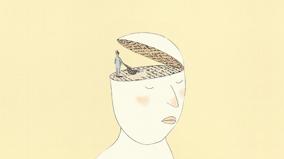New release
Coming
None
Des lumières pour Gita
2002
7 min
Leaving soon
Ce court métrage d’animation, d’après le livre de Rachna Gilmore, raconte l’histoire de la petite Gita, huit ans. Elle a très hâte de célébrer dans son nouveau pays le Divali, le festival hindou des lumières. Mais tout est différent de New Delhi, d'où elle vient. Ici, le temps est froid et gris, et une terrible tempête de verglas coupe le courant et ruine ses plans de fête. Pourtant, devant la beauté scintillante des rues glacées, le traditionnel festival de lumières prend une merveilleuse tournure... La collection Les petits conteurs est une vibrante et exceptionnelle série de courts métrages d'animation pour …

-
 Les petits conteurs2000 15 films
Les petits conteurs2000 15 films
Details
Ce court métrage d’animation, d’après le livre de Rachna Gilmore, raconte l’histoire de la petite Gita, huit ans. Elle a très hâte de célébrer dans son nouveau pays le Divali, le festival hindou des lumières. Mais tout est différent de New Delhi, d'où elle vient. Ici, le temps est froid et gris, et une terrible tempête de verglas coupe le courant et ruine ses plans de fête. Pourtant, devant la beauté scintillante des rues glacées, le traditionnel festival de lumières prend une merveilleuse tournure...
La collection Les petits conteurs est une vibrante et exceptionnelle série de courts métrages d'animation pour les enfants de cinq à neuf ans. Tiré d'un livre, chaque film reprend un célèbre conte interculturel pour enfants, qui amène les jeunes spectateurs à suivre des personnages fascinants et une trame dramatique dynamique, tout en stimulant leur imagination avec des animations finement fignolées.
La collection Les petits conteurs est une vibrante et exceptionnelle série de courts métrages d'animation pour les enfants de cinq à neuf ans. Tiré d'un livre, chaque film reprend un célèbre conte interculturel pour enfants, qui amène les jeunes spectateurs à suivre des personnages fascinants et une trame dramatique dynamique, tout en stimulant leur imagination avec des animations finement fignolées.
-
directionMichel Vo
-
animationGregory Houston
-
consulting directorSheldon Cohen
-
animation production supervisorMarie Renaud
-
NoneNormand GauthierSugith VarugheseClaude DionneDenis Chartrand
-
lead infographistJon Gasco
-
digital imagingItsik RomanoDominic TremblayRandall Finnerty
-
assistant infographistMichel ProvençalMichelle MacDonaldShira Avni
-
digitizingJean-Marc Brosseau
-
setsMichel Vo
-
backgroundsMichel Vo
-
additional animationJo MeurisLuigi AllemanoJamie MasonSerene El-haj Daoud
-
storyboard consultantSheldon CohenMarie Renaud
-
narratorGérard Poirier
-
voiceClaudia LaurieFrançois TrudelMarjorie SmithStéphanie Dolan
-
editingJosé Heppell
-
music designNormand Roger
-
sound designNormand Roger
-
sound consultationDenis Chartrand
-
sound editingJean-Baptiste RogerAndré Chaput
-
line test editorMichel Pelland
-
sound mixerSerge BoivinJean Paul VialardShelley Craig
-
technical coordinationRichard LesageAndrée Lachapelle
-
administrationGisèle GuilbaultAndrée Lachapelle
-
executive producerDavid VerrallIsobel Marks
-
producerTamara Lynch
Education
Ages 6 to 9
School subjects
Use the film as a springboard to begin researching Hinduism and Diwali. Have your students compare Diwali to other festivals of lights. Ask students to write about the use of candles in religious celebrations. Use the film to raise awareness in your class about those students who may be trying to adapt to new situations, cultures and/or religious traditions.


















